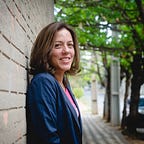Molding a future at home
Potters in Honduras sell ceramic pieces that allow them to earn a living and stay in their Lenca community.
Moisés Rivera’s mother taught him ceramics, like she had done with many family members and people in El Dormitorio, a small town near El Salvador. At first, Moisés (29) didn´t like pottery. He worked in other things when he was younger.
“I spent a lot of time in El Salvador because there was no work here,” said Moisés. He stayed for three years. He earned money but sometimes faced problems on the way back after 15 days of work. People would survey the border area and wait for the laborers to cross to steal their money, leaving them with nothing.
His new trade allows Moisés and other potters to stay home, rather that go to work in the neighbouring country. “We won´t leave anymore; we won´t emigrate from this country. We will earn our money here.”
Moisés can make ceramic pieces in the shape of chickens, donkeys and angels. His mother taught him to decorate pieces for nativity scenes at Christmas. But his specialty is money boxes in the shape of pigs, tigers and bunnies. He would earn 80 lempiras a day (U$ 3.3) for work in the countryside, while now he can make 200 lempiras (U$ 8.3) for three piggy banks he does quickly.
The advice he always gives young people, like his nephews and nieces, is to “be intelligent” about pottery. With ceramics, which is “pretty important”, they can make money and stay put. “Let´s roll up our sleeves and press ahead,” Moisés often tells them.
“We won´t leave anymore; we won´t emigrate from this country. We will earn our money here.”
Elvia, the matriarch and leader
Mrs Elvia Martínez, who´s 66 years old and has 13 children and 50 grandchildren, always hoped for a better future for her family and neighbours. Now she leads a community group dedicated to pottery. Her son Moisés and other family members are part of the group.
El Dormitorio, in the La Paz departament, had only three residents. Her husband used to make roof tiles, bricks and adobe, with family members taking on the job. That is how, slowly, they added residents and built more houses. This is the reason why the small town is also called Caserío los Rivera, her husband´s and children´s last name.
They would work mainly in agriculture before. “Since the land was not very adequate, we would always suffer and go to El Salvador to get provisions,” says Elvia. They would leave their lives behind for a few months and return with their earnings. Unfortunately, “rascals” would sometimes intercept them to take their money, backbacks and, on occasion, their lives. This is why they made an extra effort to improve their conditions at home.
“Since the land was not very adequate, we would always suffer and go to El Salvador to get provisions.”
For decades, Elvia has been negotiating improvements in her small town. She is an energetic woman who pushes ahead on the issues that matter the most to her. She learned pottery and many other things by watching others. “I like being part of what´s going on,” she says. Thanks to her current job she forgets how old she is: “I feel young because I feel their support, that I´m valued in the community.” She adds that “when we are working, we are happy because we know that money is coming in.”
They have a place to work on their ceramics and an oven, and they are already selling their pieces. Everyone is involved. The group would like to show their pieces at events and continue growing.
Some pieces are difficult to make. They also have to go out and get the clay. The secret for pieces to come out right, Elvia says, is to “stop being lazy.”
Thanks to the support of the European Union, WFP works to build the resilience and secure the livelihoods of Honduran families in the Dry Corridor. This article is part of a series produced by WFP and the social media team of the United Nations.
